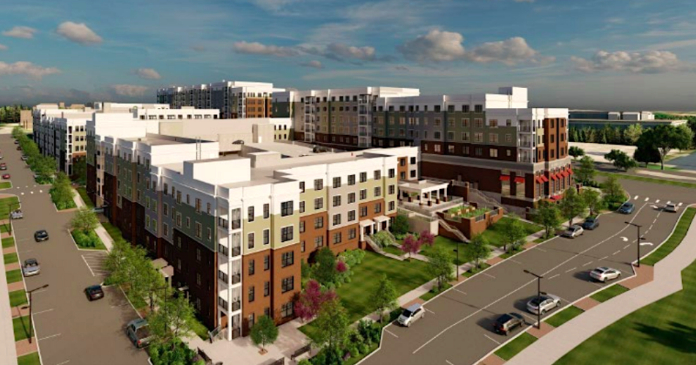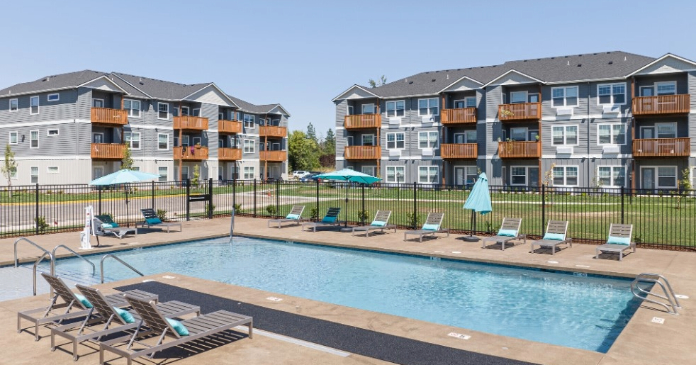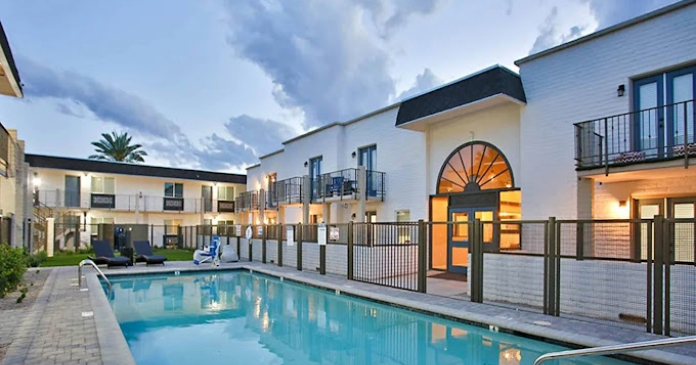That sale heralded a new vibrancy in the apartment transaction world in Massachusetts that saw only seven apartment communities worth more than $10 million change hands in all of 2009, tying with 2001 for the fewest apartment communities sold in the first 10 years of this century. On the opposite end of the deal spectrum 27 apartment properties sold in the state in 2007.
The 56-year-old locally-based Hamilton Company acquired the 35-year-old property from UBS Global Management, which sold the asset on behalf of a client in a deal that was arranged by Cushman & Wakefield Executive Directors Simon J. Butler and Biria St. John, who represented the seller and procured the buyer, to whom Butler has sold a couple of deals in the past.
The purchase was partially funded by permanent financing of $89.9 million by Wells Fargo on behalf of Freddie Mac at an interest rate market watchers put at 5.5 percent and a cap rate Butler says was just south of six percent.
“It’s very well-located and is the only large-scale apartment community left in Brookline,” said Butler, who joined Cushman & Wakefield’s Capital Markets Group in October 2006, after leaving CB Richard Ellis New England, where he focused on marketing apartment communities for 12 years.
A lot of institutional bidders, including apartment REITs, were among those rumored to have crowded the bidding table that insiders claim was crowded with multifamily heavy-hitters, both public and private. But, it was regional private money what won the prized asset that was built in 1974, 20 years after the company that bought it was founded by Harold Brown, who was in his mid-30s when Dexter Park was built on 4.2 acres of the former playing field of the Dexter School.
“He’s a terrific buyer. He doesn’t buy much, but when he decides to buy something, he gets very focused and takes an aggressive approach,” Butler said of Brown, who has been a resident of Brookline, one of the wealthier suburbs of Boston, for more 80 years. “He doesn’t chase much, but he knows what he likes.”
In addition to around 5,000 residential units, including a significant number in the neighborhoods surrounding Dexter Park, like the posh suburb of Newton, Brown also owns three million sq. ft. of commercial space.
While an institutional buyer failed to win the bidding for the asset, the emergence of those institutional players on the transaction scene indicates that New England’s economy may be strengthening.
“The institutions definitely are looking at our market again. They started appearing by the second half of the year and I think it’s a good sign. I think, compared to other markets, Boston is doing quite well,” said Butler.
And AvalonBay Communities Sr. VP Bill McLaughlin, agrees that the market is one of the best at a time when markets from coast to coast are somewhat soft. “In the last 12 months, Boston has probably been less bad, compared to our other markets,” he said.
While Washington, D.C., outpaces the rest of the country in terms of rental stability and job growth, Boston isn’t so very far behind, he agreed. “D.C. certainly feels like it’s got better employment fundamentals, but Boston’s always been pretty resilient,” said McLaughlin, who has overseen the development activities in the Boston area for AvalonBay and its predecessor Avalon Properties, Inc., for the past 15 years.
“We have historically stayed out of the tremendously high-volume markets—the Southwest and the Southeast. And that feels like a pretty smart decision today, but there are other times when those markets out-perform,” he said.
Butler, who traditionally ranks Boston among the top three markets in the country, whatever those three may be, attributes Boston’s relative good health in this ailing economy to the lack of volatility that appeals to upscale apartment REITs like AvalonBay.
“One comment I’ve heard from a couple of clients is we’re the tortoise market in terms of growth—slow and steady—and, ultimately, slow and steady wins,” said Butler, whose team sold more than $380 million in multifamily properties last year.
“Two or three years ago, we were beaten up because we were slow and boring, compared to the Sunbelt, the Floridas and other markets around the country and look at where things are today. It’s benefitted us not being the hare. I think boring could be in vogue,” he said.
The area also is appealing to a diverse group of investors because of its relatively stable employment base at the numerous colleges, universities and hospitals in the area, where the bio-tech industry also has a large presence. Greater Boston, the 10th largest metropolitan area in the country and home to the nation’s first public school, was late to emerge from the last recession, said Butler, whose team closed six deals in December. Included in that bunch was the 280-unit, eight-year-old Avalon at Flanders Hill in Westborough, about 45 miles west of Boston, that sold for nearly $41 million to institutional investor Invesco at a cap rate of around 6.7 percent, representing the second priciest single-asset multifamily transaction in the area last year.
Butler and his team also engineered the $23 million sale of the 252-unit Folly Hill Meadows in Beverly about 20 miles northeast of Downtown Boston that was sold by Pilot Development and CommonFund to MRS Management at a cap rate of around 6.8 percent. The team also arranged the sale of two former Section 8 deals, the 216-unit, 36-year-old Litchfield Terrace in Leominster for $10 million to a private buyer in Maine, with the purchase and planned overhaul backed by a $13.5 million loan from the Bank of America, $2 million from the Massachusetts Housing Partnership Fund and $2.9 million in seller financing, and the 90-unit, 42-year-old Tammy Brook Apartments on Boston’s South shore for $11.7 million to Beacon communities. Funding for that deal included $1.25 million from the Commonwealth of Massachusetts, $5.17 million from the Boston Community Loan Fund, Inc., and $1.1 million provided by US Bank and Freddie Mac. Both buyers plan to upgrade the communities while retaining their affordability for low- and moderate-income residents.
In October, Butler’s team represented AvalonBay in the sale of the 100 percent leased, 13-year-old, 171-unit, garden-style Avalon at Faxon Park in Quincy, just a few miles south of Boston to CB Richard Ellis Investors for $27.2 million. The fund that purchased the property secured $18 million in debt from Fannie Mae at 4.69 percent interest for a five-year term with a cap rate of around 6.8 percent based on trailing 90 days.
Having engineered transactions for properties ranging from workforce housing to luxury apartments over the past year, Butler has seen a diversity of investors to match the diversity of asset types. “Institutions are focused on the Class A communities and the private capital buyers are going to look at the Class B properties, generally speaking, so that’s part of what pushes us to work on a very diverse product type. We want to help everybody,” he said.
Unlike the condo craze years, when cap rates were compressed across asset classes and values were high across the board, Butler is definitely seeing a spread in cap rates today depending on location and class. “You’ve got a differentiation on the cap rates on the urban product and the suburban product, which makes very logical sense, and, on the A side, you’re looking at those trading at somewhere between six and 6.5 and the B communities somewhere between seven and 7.5, for suburban assets,” he said.
He’s watched cap rates move down a bit since the end of the second quarter and believes a psychological shift has prompted that change. “I think the perception for the first three months of the year was, ‘Gosh, the world may end tomorrow morning,’ and I think that is no longer a widely held perception,” he said.
Today, apartment investors’ outlook has changed to one of acceptance and even a bit of hope, buoyed by glimmers of the light at the end of the recession tunnel. “I think they feel like we’re bouncing along the bottom and the economy isn’t getting any worse. Maybe it’s getting better,” said Butler, who admitted that he’s an optimist by nature, adding, “Otherwise, why would I do what I do?”
With average occupancy apparently stabilized in the mid-90s, asset prices firming and rents reset to a level where they make sense, Butler is very optimistic about the apartment market in general in the Boston area, where he expects gradual rent growth going forward.















